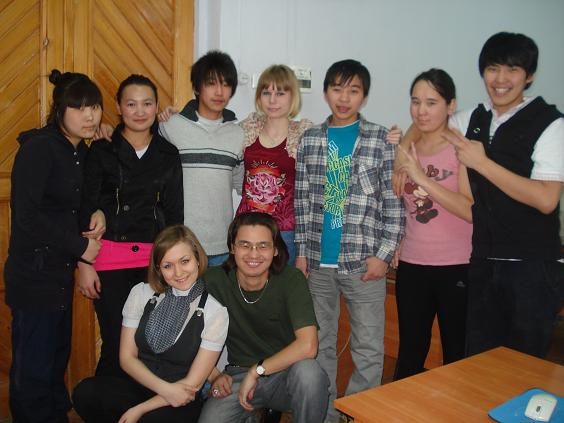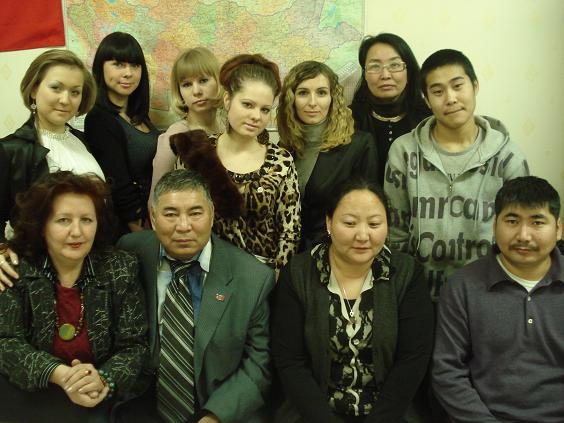Olga Aliukova, student of the Institute of Foreign Languages and International Cooperation (echange programme in Mudanjiang Normal University
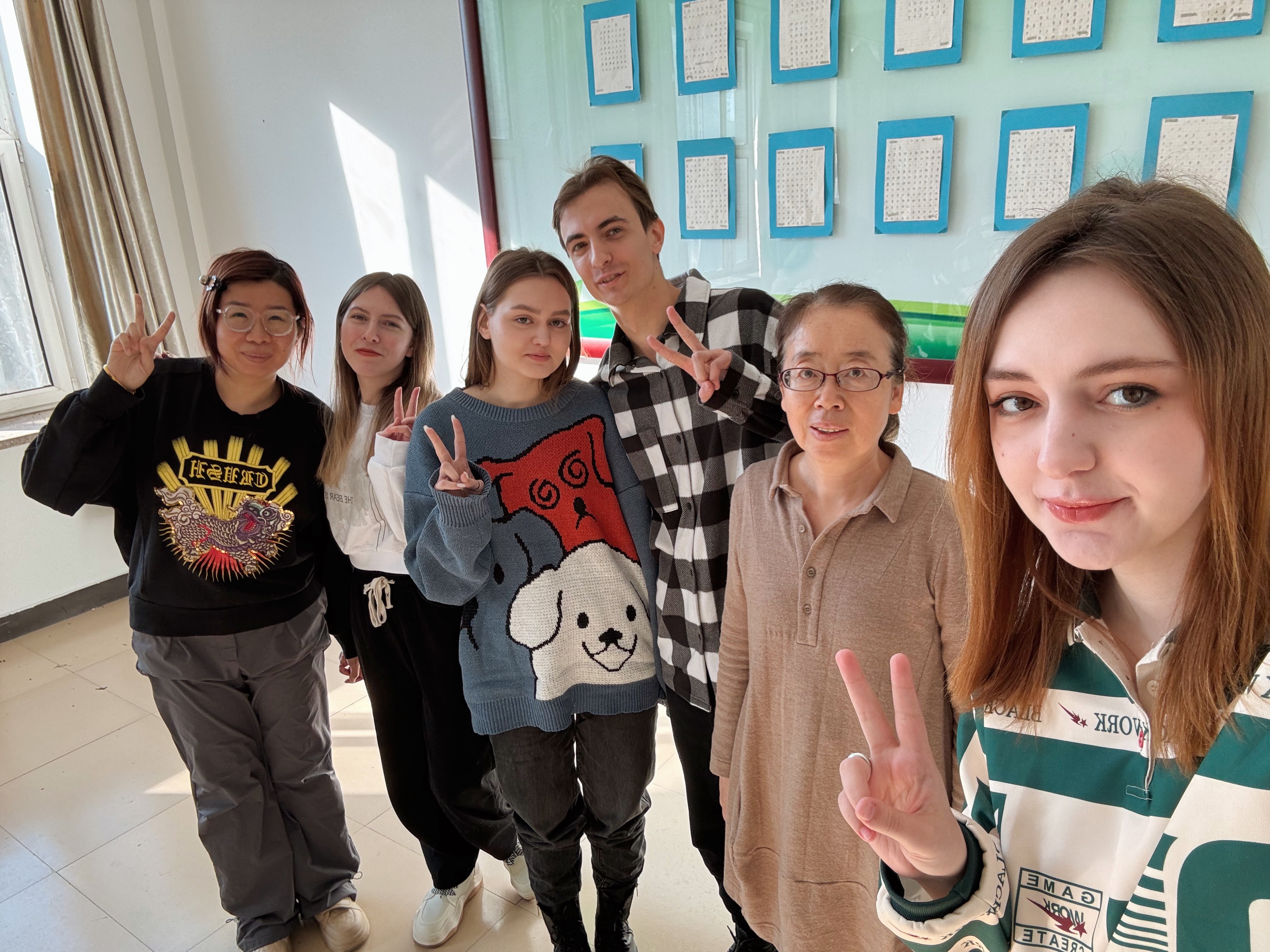 Language exchange in China is a great opportunity to immerse yourself in Chinese culture, communicate with friendly teachers and make new friends. The Chinese are always open to communication and will help you learn to speak their native language. Engaging with them will not only enhance your proficiency in Chinese but also allow you to immerse yourself in the local atmosphere and understand the peculiarities of Chinese culture.
Language exchange in China is a great opportunity to immerse yourself in Chinese culture, communicate with friendly teachers and make new friends. The Chinese are always open to communication and will help you learn to speak their native language. Engaging with them will not only enhance your proficiency in Chinese but also allow you to immerse yourself in the local atmosphere and understand the peculiarities of Chinese culture.
Teachers in China are always ready to help students learn Chinese. They have extensive experience and professionalism, which makes the learning process more interesting and effective. In addition, they are always willing to share knowledge about Chinese culture and traditions, which makes the learning experience even more fun.
Beyond education, language exchange in China, particularly in Mudanjiang city, provides an opportunity to connect with local residents and learn more about their customs. Interacting with Chinese people helps gain a better understanding of the mentality and lifestyle of local residents, as well as enables one to communicate in Chinese in real-life situations.
Overall, the language exchange in China is a great experience that will help me not only improve my proficiency in the Chinese language, allows immersion in the fascinating culture of the country. I am grateful to TSPU for giving such an opportunity to its students.
Mikhailov Mikhail, students of the Institute of Culture (on exchange programme in Wroclaw University, Poland)
 My pregraduation practicum was at Wroclaw University at Slavic studies institute. The practical part consisted of delivering lectures for Polish students – experts in the Russian language and literature. I had a great opportunity to use materials from university library for my diploma thesis.
My pregraduation practicum was at Wroclaw University at Slavic studies institute. The practical part consisted of delivering lectures for Polish students – experts in the Russian language and literature. I had a great opportunity to use materials from university library for my diploma thesis.
Another interesting fact is that the topic of my thesis is “Modern cultural relations between Russia and Europe”. In my opinion such practicum was an indispensable component for successful diploma paper. It’s extremely hard to claim anything about Europeans when you are in Siberia. I also communicated not just with the Polish, but also with young people from America, Africa, Asia and other European countries. That was extremely beneficial for me.
Andrey Y. Filtchenko, head of the Department of Indigenous Languages (exchange programme in Vienna University of Technology, Austria)

I have heard about the Erasmus Mundus program sometime before our university’s International Information Center promoted it at TSPU.
However, until this year, the program did not include Russia in its scope. So when the TSPU International Information Center announced last autumn that from 2009 Russian students and faculty can participate in this academic cooperation framework, I was immediately interested. At the Faculty of Foreign Languages of TSPU I am involved in research and teaching of linguistics, foreign languages, international history and culture. As such, I am, of course, extremely interested in any opportunity to extend my professional experience, especially through academic visits to leading European universities. I started with learning more on the internet about the program and the European host-universities. I have learned a lot about Vienna University of Technology and the University of Vienna, about the Foreign Languages and Linguistics programs, about their exciting history and innovative education experience. The TSPU Foreign Language Faculty is actively developing an improved educational policy, high quality research and education programs using the best international education practices. I was able to make an informed decision that for me, as a member of this faculty, participation in the Erasmus Mundus program would serve as an excellent opportunity to learn about the state-of-the-art in a number of disciplines from the Austrian colleagues, to get a first-hand experience in how some of the Europe’s best universities operate. Basically, there is a lot in common: we study foreign languages, linguistics, translation studies, teaching methods… Also, there are issues that are universal for any teacher, faculty, university – how to design and deliver an interesting class? how to develop an effective student oriented curriculum? how to plan and implement an efficient modern education policy? how to administer and (importantly) fund high quality research and education projects? These and other questions interest any teacher, especially in a teacher training institutional context. So for me, there was really no debate whether to try and participate. If anything, it is an unforgettable life experience – a few months at one of Europe’s most exciting places! It should also be considered, that for any program, Erasmus Mundus including, it is important to see that there is response and demand, otherwise, if the interest to academic collaboration in a certain region is low, the program management has to either revise the type of the program or change the target region. I am absolutely positive that Tomsk, and particularly TSPU has to be an active participant and should further develop international collaboration within the Erasmus Mundus and other such programs, because the prospects are truly limitless. During the last few months in Vienna I have learned a lot, enriched my experience, attended a variety of lectures and seminars of Austrian colleagues where I saw how the content of the classes is planned and delivered, what teaching methods are used, how the research and education processes are administered. I had an opportunity to communicate to students and faculty, work at the library and the university resource center. Finally, it is important for any researcher and teacher to develop and constantly extend a network of professional and personal contacts, share information, update knowledge, generate ideas and discuss problems (which turn out to be very common). Programs like Erasmus Mundus are a perfect instrument for this.
Diana Shendrikova, student of the Faculty of Foreign Languages (on exchange programme in Hiroshima University, Japan)

Last academic year I spent in Japan where I studied at Hiroshima University, which is one of the three best universities of Japan. It was unforgettable year: I met a lot of outstanding persons, visited interesting places and sights, knew a lot of new information, improved my language knowledge and realized my dream – saw sakura blossoming! All this becomes possible because our University already for many years has been closely cooperating to Hiroshima University in different fields of science.
I knew that it was possibile to make a trip when I studied at the second course but at that moment I did not have the certificate on passing international exam in the English language, TOEFL, which was necessary for participating in this programme. I didn't give up my dream and took the exam and applied for the scholarship the next year. During the whole application period the staff of our International office supported me and gave advice.They helped me to answer all questions and finally due to their help I received the grant.
Students of Hiroshima University have their meals mainly in student dining-rooms which are conveniently located close to university libraries. In the library I used to spend a lot of time after lectures: I talked with friends and prepared for my classes. I chose the classes myself, those I was interested in. I took a lot of language classes, crosscultural studies, human rights and Japanese culture and education. During spring break, I travelled around Japan. I visited old cities Kioto, Nara and modern cities Osaka and Tokyo. All of them were beautiful in a way. I travelled alone so that I might better take my bearings and improve my Japanese. Everywhere I met nice and helpful people.
I will always remember this year in Japan.
Elvira Andreeva, student of the Faculty of Foreign Languages, (on exchange programme in Technical University Dresden, Germany)

I learnt about the Erasmus Mundus programme from one of my teachers and I am thankful to her for that information. As I learnt foreign languages and I plan to apply my language skills, I believe that it’s utterly important to stay for a while in the countries of the studied languages. This experience helps to develop professional skills and competence. That’s why I decided to participate in Erasmus Mundus programme. The application procedure turned out to be not so complicated as I had expected. Besides, the grant covers all expenses, including tuition, transportation, accommodation, insurance… For me as a student, it is very important.
Staying here I received precious experience. First, every day I had to speak German not only attending classes but also in every day life. Second, I had a lot of opportunities to learn culture, do sightseeing, visiting other German and European cities. I mad friends with other international students who also came to Germany to study, so I had an opportunity to learn other cultures, enlarging my scope. That all was very important for my future profession of interpreter and translator.
Denis Kapelushnik, student of the Faculty of Foreign Languages, (on exchange programme in La Sapeinza UNiversity, Rome, Italy)

Once when, I was passing by a newsboard in our university and saw a flyer "Who wants to study in Europe, please come in our international office" (actually, it wasn't so, but it sounds really good,yeah?). I came to this office, received all necessary information and started to work on my future studying in Rome!!!!
I sent there an e-mail, since that moment the unbelievable time had begun.
You ask me what advantages I get from my study in Italy? I learn so much, many interesting subjects (don't laugh at me) meet new professors, learn new languages. Maybe the most important aspect that European system of education is a little bit different from Russian, and I can work within both these systems, and that's why I can get more advantages.
Aleksey Krapivin, student of the Faculty of Foreign Languages, (on exchange programme in Technical University Dresden, Germany)

About Erasmus Mundus Programme I learnt from my friends from Germany and was very surprised that our University took part in this project. I immediately submitted an application and began to prepare documents for the scholarship. International Information Center of TSPU rendered me great support. All the difficulties connected with application were shortly decided. Technical University of Dresden is considered to be one of the best universities of Germany and Alma Mater of many famous scientists of Germany and Europe. At Technical University of Dresden I studied intercultural Germanic studies at the Institute of Germanic studies and translation studies at the Institute of Slavic studies. Lectures and seminars are conducted by famous professors. During lessons the students work together. I would like to mention the absolute absence of bounds between German and foreign students. All the tasks in class are performed jointly. Lots of time students stay at home or library performing tasks individually. Any time students could reach professors through the Internet and receive consultation. Very often lectures are delivered by professors from other European universities. The University has all necessary conditions for successful mastering foreign language and main subject. Every student has an opportunity to study foreign language in tandem with a native speaker of the language. The library has all necessary literature therefore there are no difficulties during study. Great attention is paid to spare time activities. Students organize different cultural and sports activities. My study at Dresden was one year. During this period I received international certificates with grades for 8 subjects which prove studied subjects. I cannot help admiring beauty of Dresden where one third of population is students. I am sure that Erasmus Mundus Programme is a great opportunity to study at one of European Universities, to acquire necessary knowledge on your specialty, to get acquainted with another culture and to receive a sea of unforgettable impressions.
Olga S. Potanina, associate professor of the Department of Indigenous Languages (exchange programme in Vienna University of Technology, Austria)

The Erasmus Mundus External Cooperation Window (EM ECW) is the programme aimed at establishing cooperation between European universities and foreign academic institutions. At Tomsk State Pedagogical University the cooperation between a sending institution and a host European university is successfully guided by the coordinators of the International Office who initially provided full information concerning the EM ECW programme and opportunities it offers, distributed the information among deans, teachers, students and researchers and in some cases personally contacted prospective participants at the university. I too received the information about the programme from the coordinators of the International Office who also supplied all the necessary application forms and materials.
In my case I was lucky to fall under two individual mobility programmes at the same time: as postdoctoral student and academic staff. This not only made me eligible and qualified to apply but also shaped nicely the principle objective and the goals of my participation in the EM ECW programme.
Now I am a visiting postdoctoral student at Vienna University of Technology (TU Wien), Austria. The opportunities the programme offered for me at TU Wien contribute to my academic career (I do research work at the host university and work on a study guide for students in academic communication) and to my professional advancement (I attend courses, gain expertise in methodology of teaching, and share my experience at the host university). I find it all very beneficial for me. For a long period of time Tomsk universities as many other regional universities remained off-networked with leading researchers and institutions teaching academic and technical communication skills and new methods in teaching English as a foreign language. Vienna University of Technology offers a big number of courses on presentation skills, academic writing, technical communication, writing and reviewing of scientific papers which I find very useful as their implementation at Tomsk universities will definitely promote international standards of education and improvement of quality. As an EM ECW fellow I actively participate in classroom discussions and share my experience with students and teachers at TU Wien: gave a talk on presentation skills and the other one on methodology of teaching English at Tomsk universities.
I think it is very important that now the exchange programme EM ECW helps us to enhance the educational and cultural links with European universities. I believe my participation in this programme will greatly contribute to the curriculum development at the sending institution and new courses design or the update of the existing ones.
Kolesnikova Maria and Sosedova Margarita, students of of the Physics and Mathematics Facuty, (on exchange programme in Wroclaw University, Poland)

For the first time we knew about student exchange programme with Wroclaw University from our friend Snegirev Timofey. We became interested in this programme and decided to submit our applications if we received an opportunity to study abroad. We suppose that experience of studying abroad is very important for a student.
Firstly, it is very interesting to go to another country, to get acquainted with foreign people, to speak their language.
Secondly, it is study at the university with another system of education and study of subjects using foreign language. One gets an opportunity to weigh its abilities and to know a lot of new and interesting things. Study abroad stimulated us for further work.
Communicating with students of Wroclaw university we knew a lot of amazing things about Polish culture and stereotypes that they had about us. We are very glad that we came there and that there are such programmes because it is very fascinating and informative. It is always interesting to know how live and receive education people with other traditions and customs, to tell about yourself and your culture, to acquire a lot of foreign friends.
Timofey Snegerev, student of the Physics and Mathematics Faculty (on exchange programme in Wroclaw University, Poland)

Information about possibility to go to study at Wroclaw university I received from our Vice-Rector on International Affairs Epp Vladimir Yakovlevich. I agreed immediately because it was something new, unexplored, an opportunity to communicate not simple with other people but with people speaking foreign language and with other mentality. I wanted to learn it from within. Certainly one of the requirements was knowledge of the Polish language but I improved the situation enrolling to the courses of the Polish language which were offered at our University. For students such an event is especially important as receiving new knowledge during students time is very influential and impressions are very deep. There is no doubt that positive experience which I have acquired is difficult to overestimate. The only thing I want to emphasize that everywhere live people like us.
Yunona Shcherbina, student of the Foreign Languages Department (on exchange programme in Ochanomizu University, Tokyo, Japan)

In autumn 2007 I came to the International Affairs Team to know about the exchange programs with the Japanese universities – Ochanomizu University (Tokyo) and Hiroshima University. According to these programs the 2-4 year students with a high level of English or Japanese language can get a scholarship in one of the Japanese universities for 6 to 12 months. The differences between the universities are in the dead-line for the applications and the location in Japan. I was lucky enough to get a scholarship in Ochanomizu University which is situated in the capital of Japan and is among its best universities.
The journey to Japan helped me not only in polishing my Japanese but also in improving my English and German. I had a free choice of subjects in the university and I composed my schedule in order to have spare time after classes to try such types of Japanese art as tea ceremony, calligraphy and kimono. Moreover I could travel through Japan and enjoy the bright autumn in Nikko, the Golden temple in Kyoto and the warm ocean and sun on the Okinawa islands. The study in Ochanomizu University helped me in my cultural development as I met people from the totally different cultures and countries. In addition this journey determined my future which would be certainly connected with Japan and its culture. I hope to have another chance to study in one of the main Japanese universities.
 3 position among best student cities of Russia (after Moscow and St-Petersburg)
3 position among best student cities of Russia (after Moscow and St-Petersburg)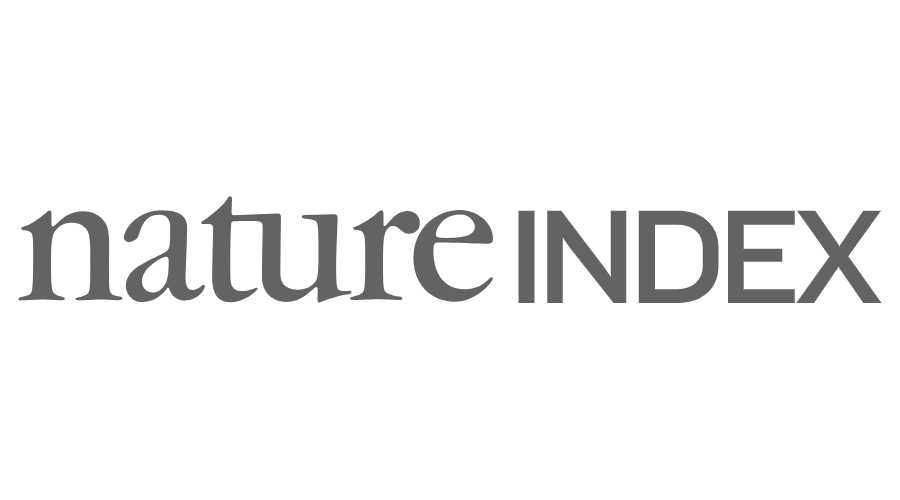
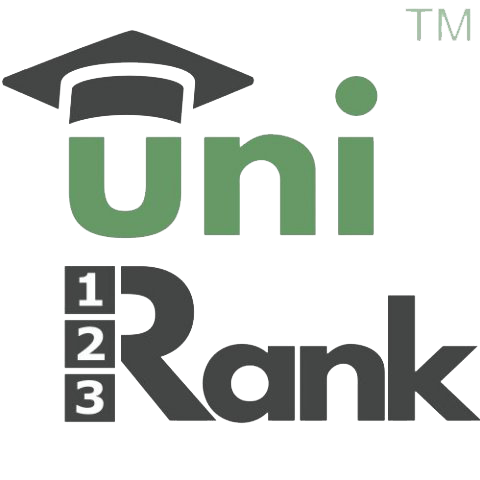









.png) Byambasuren Lkhundev (in the photo first on the right), Purevdulam Davaanyam (in the photo first on the left, students of the preparatory courses on the Russian language, Mongolia:
Byambasuren Lkhundev (in the photo first on the right), Purevdulam Davaanyam (in the photo first on the left, students of the preparatory courses on the Russian language, Mongolia:.png) Enkhbaatar Munkh-Od, student of the preparatory courses on the Russian language, Mongoilia:
Enkhbaatar Munkh-Od, student of the preparatory courses on the Russian language, Mongoilia:.png) Moltsog Byambanaran, student of the preparatory courses on the Russian language, Mongoilia:
Moltsog Byambanaran, student of the preparatory courses on the Russian language, Mongoilia:.png) Enkhbat Khash-Erdene, student of the preparatory courses on the Russian language, Mongolia:
Enkhbat Khash-Erdene, student of the preparatory courses on the Russian language, Mongolia:.png) Enkhbaatar Tuvshin-Erdene, student of the preparatory courses on the Russian language, Mongolia:
Enkhbaatar Tuvshin-Erdene, student of the preparatory courses on the Russian language, Mongolia:.png)

 Language exchange in China is a great opportunity to immerse yourself in Chinese culture, communicate with friendly teachers and make new friends. The Chinese are always open to communication and will help you learn to speak their native language. Engaging with them will not only enhance your proficiency in Chinese but also allow you to immerse yourself in the local atmosphere and understand the peculiarities of Chinese culture.
Language exchange in China is a great opportunity to immerse yourself in Chinese culture, communicate with friendly teachers and make new friends. The Chinese are always open to communication and will help you learn to speak their native language. Engaging with them will not only enhance your proficiency in Chinese but also allow you to immerse yourself in the local atmosphere and understand the peculiarities of Chinese culture. My pregraduation practicum was at Wroclaw University at Slavic studies institute. The practical part consisted of delivering lectures for Polish students – experts in the Russian language and literature. I had a great opportunity to use materials from university library for my diploma thesis.
My pregraduation practicum was at Wroclaw University at Slavic studies institute. The practical part consisted of delivering lectures for Polish students – experts in the Russian language and literature. I had a great opportunity to use materials from university library for my diploma thesis.























